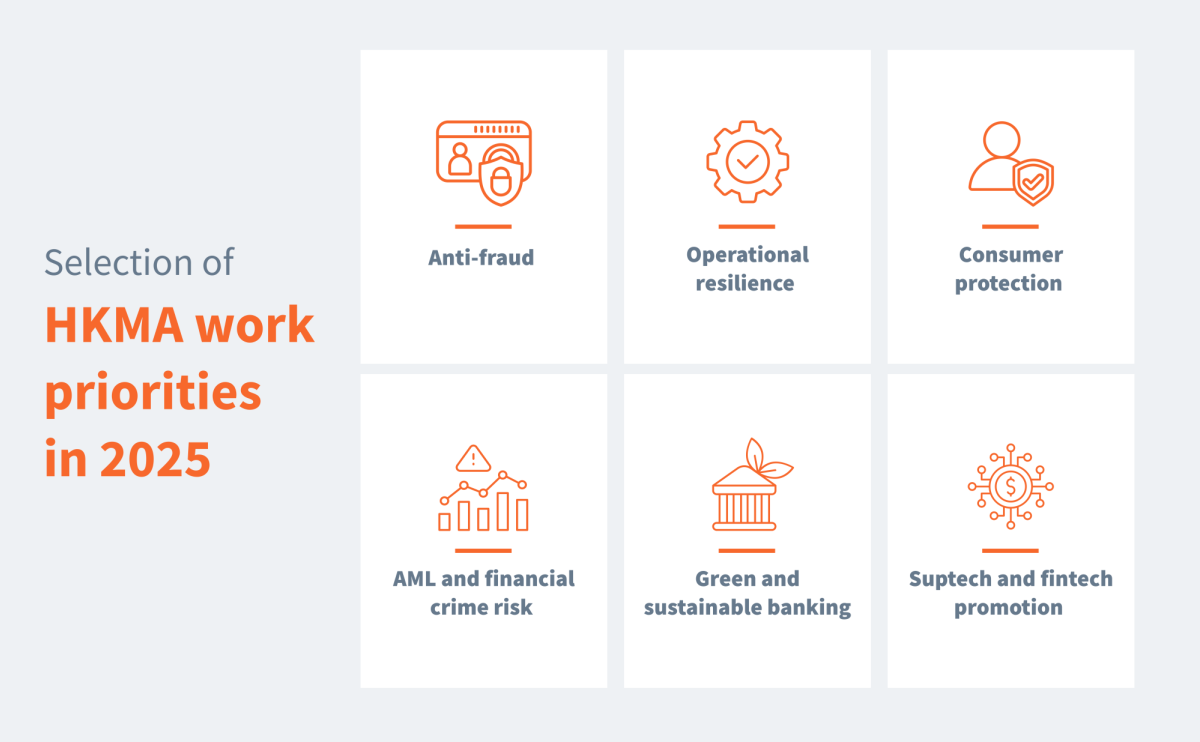Summary
The Hong Kong Monetary Authority (HKMA) has released its yearly publication for banking review and priorities, highlighting the priorities on credit risk landscape, anti-fraud measures, AML and financial crime risk, customer protection, green and sustainable banking, supervisory technology (suptech) and fintech promotion.
An overview of HKMA’s 2025 Banking Priorities
We will explore certain key topics of focus and help you stay ahead of the regulatory curve.


To combat the increasing fraud activities financial institutions must prioritise pre-emptive and agile responses, collaborate with financial regulators, and promote customer education. Additionally, they should continue to adopt innovative methods to safeguard against evolving fraudulent schemes and protect their customers' assets and information effectively.
HKMA’s areas of focus
- Proactive measures: HKMA is continuously tightening rules to combat digital bank fraud, financial institutions shall enhance customer protection controls, respond effectively to scam claims, and strengthen banks' anti-fraud capabilities.
- Collaboration: Engage with financial regulators to expand information sharing and gain insights on emerging trends.
- Education and promotion: Improve public awareness through tailored campaigns
Innovation: Develop streamlined processes for handling scam claims.
Where banks can improve
- Assess your current position: Assess your current framework by reviewing and enhancing processes, procedures, and technology, including validating rules and models, to pinpoint areas for improvement in fraud detection and prevention accuracy.
- Acquire industry insights: Seek industry insights and experiences from peer financial institutions and fraud prevention vendors to gain valuable perspectives on best practices and effective solutions in the field. This includes collaborating with financial regulators and Big Tech, broadening information sharing, and engaging in supervisory dialogues to stay informed on trends and responses.
- Leverage accessible resources: Make the most of available resources, such as vendor benchmarking and control libraries, to streamline project execution efficiently and maintain high quality investigators. Access our fraud training materials and fraud control library to streamline your processes effectively.
- Collaboration and Innovation: Foster collaboration in anti-fraud measures and streamline the process. Access our target operating model design to optimise and streamline your processes effectively.
To learn about effective anti-fraud measures and safeguarding your organisation, reach out to our expert, Brandon Lobo at brandon.lobo@synpulse.com.

HKMA’s areas of focus
- Due to a growing number of controls, banks often resort to reactive methods to detect risks, leading to potential regulatory fines and damage to their reputation. HKMA emphasises the significance of evaluating the progress of operational resilience implementation, as well as enhancing high-risk transaction alerts, offering optional advanced security measures and uplifting response and recovery capabilities.
Where banks can improve
- Enhance early detection measures: Enhance your systems to identify potential risks at an early stage, allowing for proactive risk management and mitigation strategies.
- Maximise risk detection capabilities: Leverage resources to enhance your ability to detect and evaluate various types of risks throughout the operations.
- Trigger timely actions: Fortify your high-risk alert systems to adjust risk assessments in real-time based on operational changes or emerging risks.
For more insights to increase your banks operational resilience please connect with our expert Gregory Achache at gregory.achache@synpulse.com, and Anu Meha at anu.meha@synpulse.com.

Customer protection is a crucial aspect for financial institutions, encompassing measures to ensure trust, regulatory adherence, and sustainable business practices. It involves safeguarding customers across all services, including banking, investment, and wealth management, as well as supporting infrastructure.
HKMA’s areas of focus
- Investor and consumer protection: Focus on regulations regarding insurance and investment product selling and transactions to enhance investor protection and safeguard consumer interests.
- Bank culture and Infrastructure: Mandatory reference checking scheme is being implemented to promote a positive and trustworthy banking culture, which, in turn, is expected to strengthen the financial infrastructure.
Where banks can improve
- Develop a risk management framework for investor and consumer protection: Develop and execute a thorough risk management framework that aligns with the HKMA's emphasis on investor protection in insurance and investment product sales.
- Enhance sales governance and risk-awareness culture: Strengthen sales governance processes to boost transparency and ensure adherence to suitability requirements. Develop a risk-awareness culture within the organisation to empower bank staff continually in protecting investors.
For insights on customer protection and sales governance, connect with our expert, Anu Meha at anu.meha@synpulse.com.

Ensuring effective anti-money laundering (AML) and financial crime risk management is essential for financial institutions to combat illicit activities and protect the integrity of the financial system. By leveraging advanced technologies, such as artificial intelligence (AI) and data analytics, institutions can improve their monitoring capabilities and early detection of suspicious activities.
HKMA’s areas of focus
- Understand and disrupt: Financial institutions shall identify potential weak spots despite advancement, fortify monitoring efforts and deliver proportionate guidance.
- Enhance and protect: HKMA advocates for improved suspicious activity monitoring using AI technology, enhancing capabilities to combat sophisticated money laundering.
- Collaborate and share: HKMA promotes heightened information sharing and early detection enhancement to foster collaboration and proactive risk mitigation.
Where banks can improve
- Know Your Customer (KYC): Incorporate Network Link Analysis (NLA) into Know Your Customer (KYC) procedures to identify potential weak spots amid technological advancements. Utilise real-time data feeds for dynamic risk scoring, enabling continuous screening for sensitive industries, sanctioned countries, and politically exposed persons, while strengthening monitoring and providing proportionate guidance.
- Transaction monitoring: Leverage AI and machine learning (ML) for transaction monitoring, utilising entity resolution and NLA to improve detection quality, alert triage, resolution, and Suspicious Activity Report (SAR) filing. Implementing an appropriate operating model can enhance AML risk mitigation capabilities and provide transparency in client transactions.
- Client due diligence and enhanced client due diligence: Use natural language processing (NLP) along with AI/ML, NLA, and for client due diligence and enhanced client due diligence. This approach streamlines risk assessment processes, automates tedious due diligence tasks, and generates high-quality risk reports for KYC and case management, fostering collaboration and information sharing in the AML landscape.
To learn the right AML measures for your organisation, contact our topic expert Brandon Lobo at brandon.lobo@synpulse.com and Marina Mai at marina.mai@synpulse.com.

Embracing green and sustainable banking practices is becoming increasingly important for financial institutions to address environmental challenges and meet evolving stakeholder expectations. Strengthening climate resilience is anticipated to generate lasting value for financial institutions in the long run.
HKMA’s areas of focus
- Sustainable finance action agenda: Launched the sustainable finance action agenda, outlining the vision to strengthen Hong Kong's position as the sustainable finance hub in the region.
- Further strengthen the climate resilience of the banking sector: Focus on taxonomy phase 2, transition planning, sustainability disclosure, supervision, and climate risk stress tests to enhance the climate resilience of financial institutions.
Where banks can improve
- Develop a customised climate risk framework: Align your climate risk framework with both local and global pathways with industry best practices including ESG requirements, risks and opportunities that you should look out for, as highlighted by HKMA's sustainable finance action agenda. Explore stress testing solutions tailored to your organisation's needs, contributing to the further strengthening of the climate resilience emphasised by HKMA's taxonomy phase 2 and transition planning initiatives.
- Establish an integrated dashboard: Enhance risk management practices by implementing an integrated dashboard that consolidates diverse ESG insights and visualisation requirements, in line with HKMA's focus on sustainability disclosure and supervision. By orchestrating a comprehensive dashboard, you can better address climate risk stress tests, as emphasised by HKMA's initiatives to enhance the climate resilience of the banking sector.
Elevate your banking sustainability efforts by reaching out to our expert, Anu Meha at anu.meha@synpulse.com and Gemma Bi at gemma.bi@synpulse.com, aligning with HKMA's sustainable finance action agenda and the overarching goal of fostering a more resilient and sustainable banking sector.

Promoting suptech and fintech initiatives is essential for financial institutions to stay competitive and compliant in a rapidly evolving digital landscape. By prioritising suptech and fintech promotion, financial institutions can enhance their operational resilience, improve customer experience, and drive sustainable growth.
HKMA’s areas of focus
- Support responsible innovation: HKMA encourages responsible innovation through initiatives like the GenAI. Sandbox, a supervisory incubator dedicated to exploring Distributed Ledger Technology (DLT).
- Tech maturity assessment (preliminary results): There is a growing interest in more sophisticated adoption, aiming to foster cross-border fintech cooperation in Greater Bay Area (GBA).
- Suptech: HKMA promotes the adoption of data-driven and technology-empowered supervision, and the enhancement of risk data collection.
Where banks can improve
- Leverage expertise knowledge: Engage with technology vendors possessing a strong foundation in the field and an in-depth understanding of wealth management, in line with HKMA's encouragement of responsible innovation. Access our industry insights to learn about best practices for ensuring compliance.
- Bridge technological gaps: Harness advanced knowledge of GenAI and DLT, mirroring HKMA's focus on assessing tech maturity and promoting sophisticated adoption.
- Enhance data analytics for actionable intelligence: Strengthen operational and regulatory risk management by utilising tools like our SRS Risk Supervisor, reflecting HKMA's emphasis on suptech.
To explore the possibilities of cutting-edge technology for your bank, connect with our subject matter expert, Gregory Achache, at gregory.achache@synpulse.com.
The HKMA’s 2024 review highlights key priorities for 2025, from anti-fraud and operational resilience to green banking and fintech adoption. To stay ahead, banks must embrace innovation, collaboration, and strong risk management. Synpulse can help you navigate these changes and drive sustainable growth. Contact our experts to future-proof your organisation.


